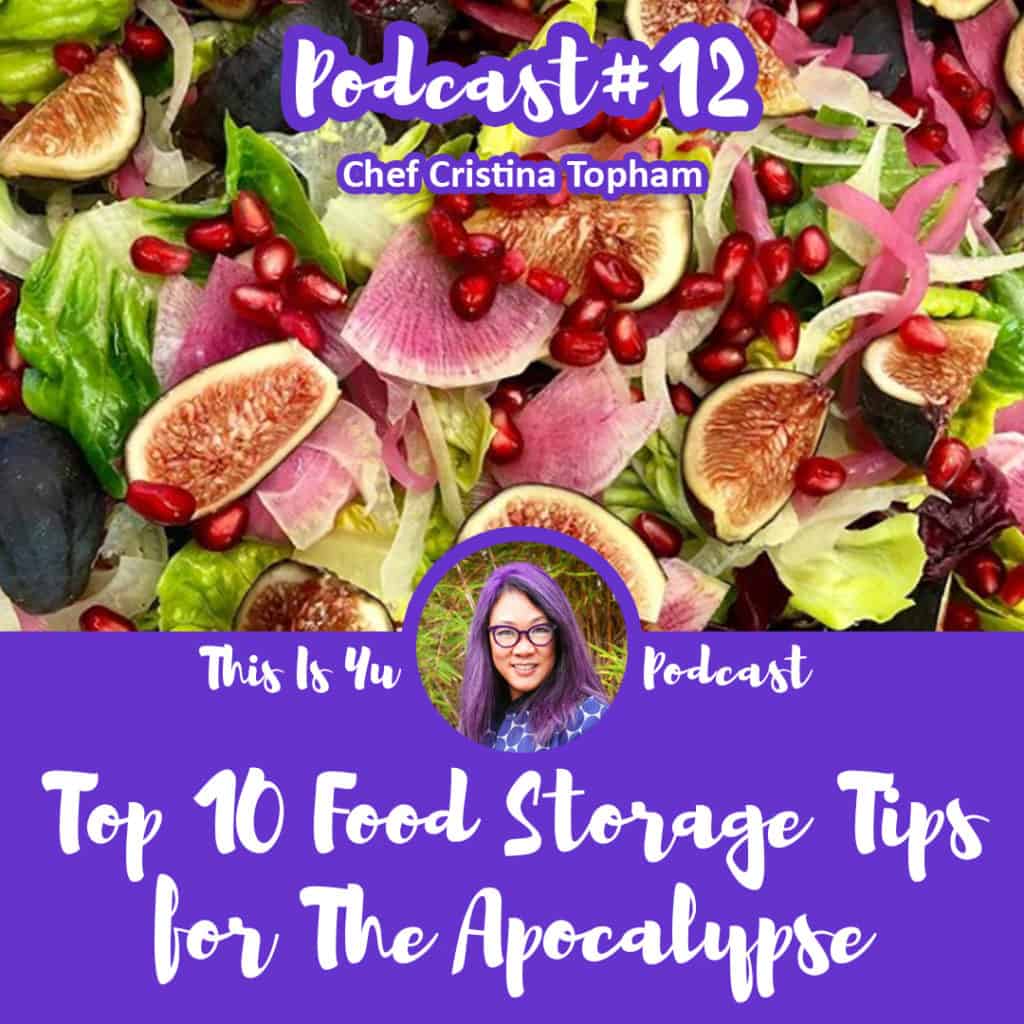Recently, we had the honor to speak with Chef Cristina Topham on our Podcast. We discussed the Top 10 Food Storage Tips for the Apocalypse. Catch it on Episode 12 and see her expanded tips in her guest blog post below.

Chef Cristina Topham - guest blog post
I’ve been a professional chef for over 20 years and spent much of that time cooking aboard private yachts all over the world. Often times, we had to stock the boat with enough provisions to last for 2 or 3 weeks because we’d be heading to really remote locations without access to grocery stores (like the middle of the Bermuda Triangle — but that’s a story for another day). I never thought my provision-packing would come so handy on dry land, but low and behold, here we are stocking our pantries to hunker down and flatten the Covid-19 curve.
Here are my Top-10 Food Storage Tips that you might find useful in these strange times.
1. Food lasts longer in a clean fridge!
Seriously. We all know your produce drawer looks like a science project and there’s a shriveled up carrot and rock hard lump of cheese that’s been hanging out on that lower back shelf since the Christmas of ’08. Now is the time to clean that shit out. Wash the drawers and shelves. Wipe out your fridge with a bleachy towel or disinfecting spray. And, while you don’t have to detail-clean your fridge everyday, you should do it once a month, even when you’re not shopping for the apocalypse.
2. Wash your produce and wipe down all your jars, bottles, and containers
This will clean off any gunk from your previously dirty fridge and also get rid of any contaminants that may have been picked up in the grocery store.
3. Pack your fridge in the order you’re going to eat from it
If you have a very full fridge, this hampers circulation and sometimes the back can freeze. Hearty vegetables and ingredients like doughs, butter, cheese, jams, bread, etc. can withstand a little freeze. Stick them in the back and save the front for your herbs and lettuces.
4. Moisture is not your friend
If you’re like me and hoarding cilantro and basil instead of toilet paper, wrap your herbs in a paper towel and store them in a plastic bag. Keep them in the crisper drawer or towards the front of the fridge where they won’t get frozen. This goes for any other soft greens like arugula, spinach, and lettuce too.
5. Save your heartiest vegetables for last and eat the foods that are going to spoil the quickest first
Eat your seafood, berries, herbs, arugula, etc. early on. Your hearty vegetables like cauliflower, broccoli, kale, escarole, potatoes, onions, etc. will last a week or more.
6. If you happen to raise your own chickens in a truly free-range environment, which lessens the chances of salmonella or you happen to live in Europe, you may not have to refrigerate your eggs.
Chickens in Europe are vaccinated against salmonella and while it’s not required by law in the U.S., almost 90% of layer flocks here are vaccinated.
When I worked aboard smaller yachts with limited storage, we didn’t refrigerate our eggs. The health department wouldn’t agree with me on this, but they also advocate cooking a steak well-down and never eating raw fish. So, I’ll leave it for you to decide… But, I was cooking for Meryl Streep for a few weeks on a little 80’ sailboat in the middle of the ocean. I didn’t have room to refrigerate the eggs so I kept them in storage below the floorboards in the galley. Her husband liked his eggs over-easy which only became problematic because when you don’t refrigerate eggs, the membrane between the yolk and the white weakens. I must’ve cracked 10 eggs in my attempt to get two over-easy eggs without a broken yolk. And hey, my eggs didn’t kill Meryl or her husband — so, case in point. Also, plenty of countries don’t even keep their eggs refrigerated in the grocery store.
Here’s some additional info to help you make an informed decision. https://www.latimes.com/…/la-oe-amundsen-egg-washing-and-sa…
7. Freeze your bread
Pull out a few slices as you need it.
It only takes a few minutes to thaw, or throw the slices right into the toaster. Or, freeze half the loaf and just keep out what you’ll use within a few days.
8. Air is not your friend!
Use the smallest possible container for your foods. As a general rule in any commercial kitchen, you transfer foods into the smallest possible container before you put it away (unless you want to drive the chef nuts). This frees up space in your fridge, which improves airflow to ensure even chill temps, and it also decreases the amount of surface area for contaminates to grow on (see, it’s back to that whole “clean fridge” thing).
9. Not to be Captain Obvious here but FIRST IN, FIRST OUT!
For ingredients with expiration dates, use up the oldest items first. You can even get a big ol’ magic marker and write “USE FIRST” on stuff so the rest of your family can look at you like you’re an anal retentive nut while you have the sweet satisfaction of knowing that all your milk will get used up in proper order and not end up in the bin.
10. Expiration dates are kind of bullshit
My brother used to be a delivery truck driver for a wholesale food vendor. I spent my childhood drinking perfectly good, but expired, Capri Suns, eating expired granola bars, cereal, and cheese. You wouldn’t throw money down the drain but that’s what you do when you throw out “expired” food that isn’t actually spoiled. Trust your god-given senses. The nose knows. Does it smell bad? No? Does it look funky? No? It probably won’t kill you.
Stay safe, stay healthy. Wash your hands. Spread love, not germs.
Xox, Chef Cristina








